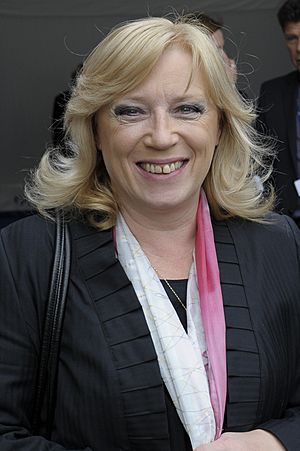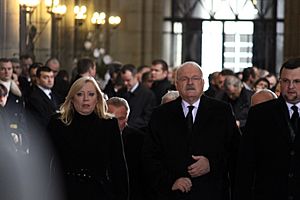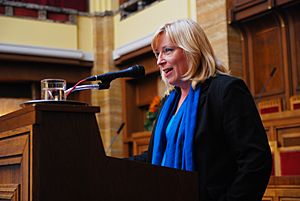Iveta Radičová facts for kids
Quick facts for kids
Iveta Radičová
|
|
|---|---|

Radičová in 2010
|
|
| Prime Minister of Slovakia | |
| In office 8 July 2010 – 4 April 2012 |
|
| President | Ivan Gašparovič |
| Preceded by | Robert Fico |
| Succeeded by | Robert Fico |
| Minister of Defence | |
| In office 28 November 2011 – 4 April 2012 |
|
| Preceded by | Ľubomír Galko |
| Succeeded by | Martin Glváč |
| Minister of Labour | |
| In office 17 October 2005 – 4 July 2006 |
|
| Prime Minister | Mikuláš Dzurinda |
| Preceded by | Ľudovít Kaník |
| Succeeded by | Viera Tomanová |
| Personal details | |
| Born |
Iveta Karafiátová
7 December 1956 Bratislava, Czechoslovakia (now Slovakia) |
| Political party | Democratic and Christian Union-Democratic Party (2006–2012) |
| Spouses | Stano Radič (Deceased 2005) Marián Balázs |
| Alma mater | Comenius University Slovak Academy of Sciences |
| Signature | |
Iveta Radičová (born 7 December 1956) is a Slovak sociologist and a former important political leader. She served as the prime minister of Slovakia from 2010 to 2012. She was the first woman to hold this high position in Slovakia.
As prime minister, Iveta Radičová led a government made up of several political parties working together. Her main goals included helping the country's economy recover after a big economic slowdown. She also worked to reduce the government's debt by cutting down on spending.
Before becoming prime minister, Radičová started her career as a university professor studying society. She was one of the few women who played a big part in the Velvet Revolution in 1989. This was a peaceful change that ended communist rule in Czechoslovakia. She later became a minister in the government, looking after labor and social affairs.
In 2010, she became the leader of her political party and then the prime minister. Her government faced challenges and eventually ended in 2011 over a vote about European financial support. After leaving politics, she returned to teaching at a university.
Contents
Early Life and Education
Childhood and School
Iveta Karafiátová was born in Bratislava, which was part of Czechoslovakia at the time, on 7 December 1956. She grew up in a time when the country was under communist rule. She has shared that her family faced financial difficulties during her childhood.
Iveta was a bright student. When her father took her to enroll in school, the headmaster let her skip kindergarten because she could already read. She enjoyed dancing for many years, stopping when she was sixteen. Even though she faced some challenges in high school, she was still accepted into university.
University and Early Career
From 1975 to 1979, Iveta studied sociology at Comenius University. Sociology is the study of how societies work. She had hoped to combine sociology with mathematics, but that specific program was not available. While at university, she met Stano Radič, and they married in 1979. They had a daughter named Eva in 1980.
After getting her first degree, Iveta Radičová continued her studies at the Slovak Academy of Sciences. There, she earned her PhD in sociology. In 1979, she started working at the Slovak Academy of Sciences, studying how families were affected by government policies. Unlike many others in her field, she chose not to join the Communist Party. She focused on research methods, which allowed her to avoid political topics.
Academic Work and Activism
Public Involvement
In 1989, when the Velvet Revolution began, Iveta Radičová became involved with a group called Public Against Violence. She was one of the few women who spoke out publicly during this important time. This movement helped bring about peaceful change in Czechoslovakia.
After the revolution, Radičová taught sociology and political science at Comenius University. She also started the Social Policy Analysis Center in 1992, where she was the director until 2005. She focused on studying issues related to gender and society. She also worked with the Slovak branch of the Open Society Foundations.
Radičová did not support the idea of Czechoslovakia splitting into two separate countries in 1993. She believed in a democratic government during the time when Vladimír Mečiar was in power, which was a challenging period for democracy. In 2005, she became a full professor, making her the first woman in Slovakia to be a sociology professor. Sadly, her husband passed away in 2005.
Political Career
Becoming a Minister and Member of Parliament
In 2005, Mikuláš Dzurinda, who was the prime minister, asked Iveta Radičová to become the Minister of Labor, Social Affairs, and Family. Even though she had not been elected, she was chosen because of her knowledge in these areas. It was a new experience for her to work as a government minister.
The next year, in 2006, Radičová decided to run for a seat in the National Council, which is Slovakia's parliament. She was elected as a candidate linked to a center-right political party called the Slovak Democratic and Christian Union – Democratic Party (SDKÚ-DS). She officially joined the party later that year and became its deputy leader. In parliament, she focused on issues important to families and social support.
Presidential Campaign
In 2009, Iveta Radičová ran for president of Slovakia. She was the main candidate for the opposition parties. She tried to show herself as a calm and fair leader, avoiding arguments and personal attacks. Some critics said she wasn't aggressive enough to fight for the country's interests.
Radičová received the second-highest number of votes in the first round, which allowed her to go to the second round against the current president, Ivan Gašparovič. However, she lost the final election, getting 44.5% of the votes compared to Gašparovič's 55.5%.
Return to Parliament and Becoming Prime Minister
After the presidential election, Radičová had a small issue in parliament. In April 2010, she cast a vote for a colleague who was not present, which was against the rules. She quickly resigned from her seat a few days later. However, she remained the deputy leader of her party.
She then successfully ran for parliament again in the 2010 election. Although her party did not win the most votes, the previous prime minister could not form a new government. This allowed Iveta Radičová's party to form a group of parties working together, and she became the Prime Minister of Slovakia.
Prime Minister of Slovakia



Iveta Radičová's government was a mix of her own party (SDKÚ-DS) and other parties like the Christian Democratic Movement, Freedom and Solidarity, and Most–Híd. Her time as prime minister was sometimes called "accidental" because of how her government came to be.
Her position as prime minister was not always easy. There were disagreements among the parties in her government. Also, some officials had to be replaced due to issues that caused a loss of trust. In November 2011, when the minister of defense resigned, Radičová took on that role temporarily herself.
In 2011, her government faced a big challenge with a vote on a European financial support plan. One of the parties in her coalition disagreed with the plan. Radičová said that voting against it would mean her government would fall. The party still voted no, and her government ended. Radičová and her party later said that working closely with Europe was more important than keeping the government together.
Key Policies
A major focus for Radičová's government was the economy. She became prime minister as the country was recovering from a big economic downturn. Slovakia faced challenges like high unemployment and a large government debt. During her time, unemployment in the country did decrease.
Radičová promised that her government would cut government spending to reduce the debt, without raising taxes. She said they were ready to lead the country during a difficult economic time. She also worked to improve relations with Hungary, which had been tense.
She also tried to make the government more open and honest. She made sure that all government contracts were available for everyone to see online. However, her government still faced some issues with trust during her time. One notable event was the Gorilla scandal, which involved concerns about meetings between some officials and businesses. This affected public trust and her party's performance in the next election.
Because her time as prime minister was short, Radičová was not able to achieve all her policy goals. She also noted that the economic crisis made it harder to govern across Europe.
After Being Prime Minister
After leaving her role as prime minister, Iveta Radičová was succeeded by Robert Fico. She decided to leave politics and returned to teaching at Comenius University. She also gave up her membership in the SDKÚ-DS party in May 2012.
In 2013, Radičová wrote a book about her experiences as prime minister. In 2017, she was chosen as the Dean of the Faculty of Mass Media at Pan-European University. She also received an award from Women Political Leaders in 2017. Polls have shown that many people in Slovakia still see her as one of the country's best recent politicians.
In 2012, Radičová began a relationship with Marián Balázs, who used to lead her team of advisors.
See also
 In Spanish: Iveta Radičová para niños
In Spanish: Iveta Radičová para niños
 | William L. Dawson |
 | W. E. B. Du Bois |
 | Harry Belafonte |


